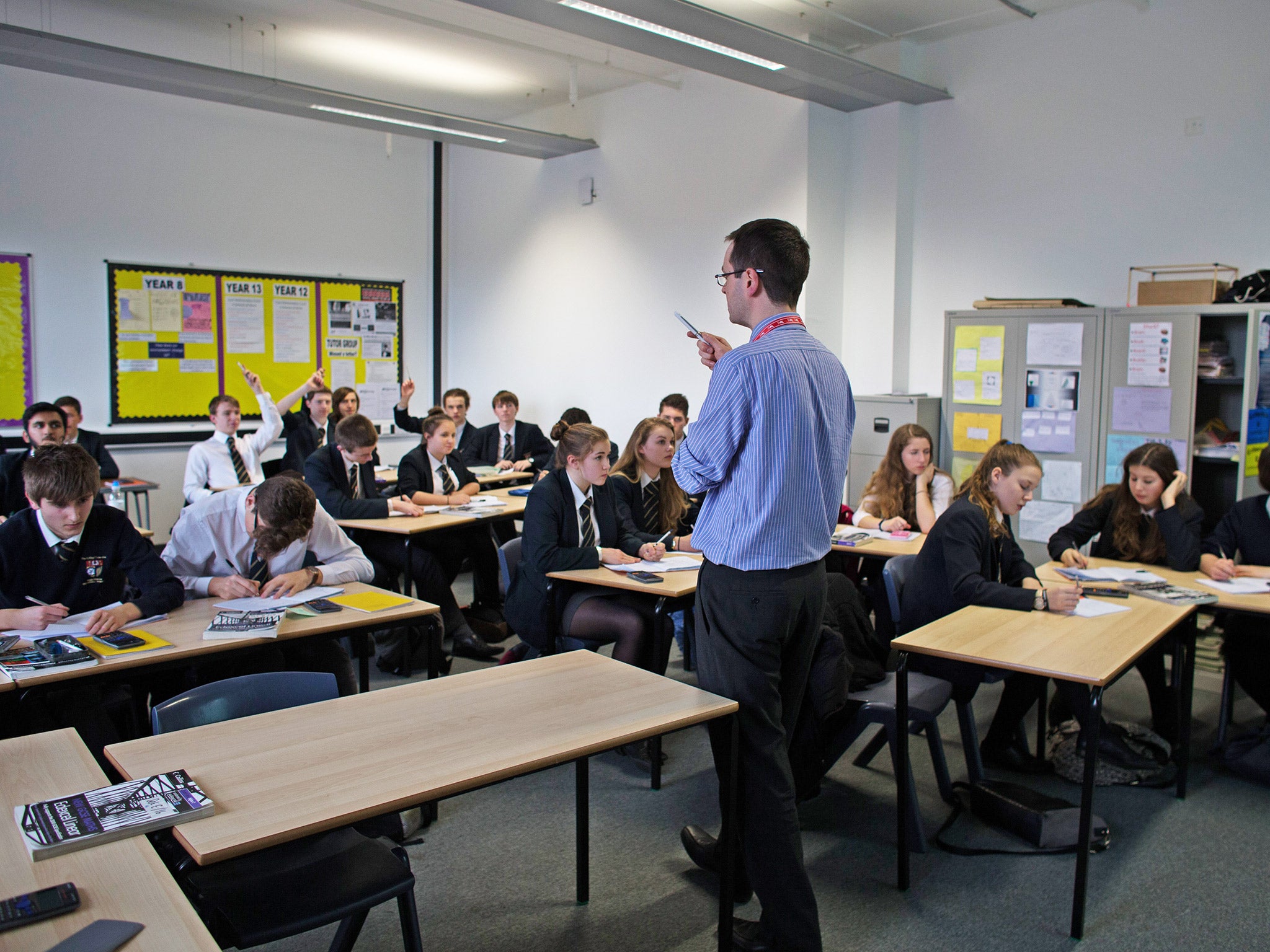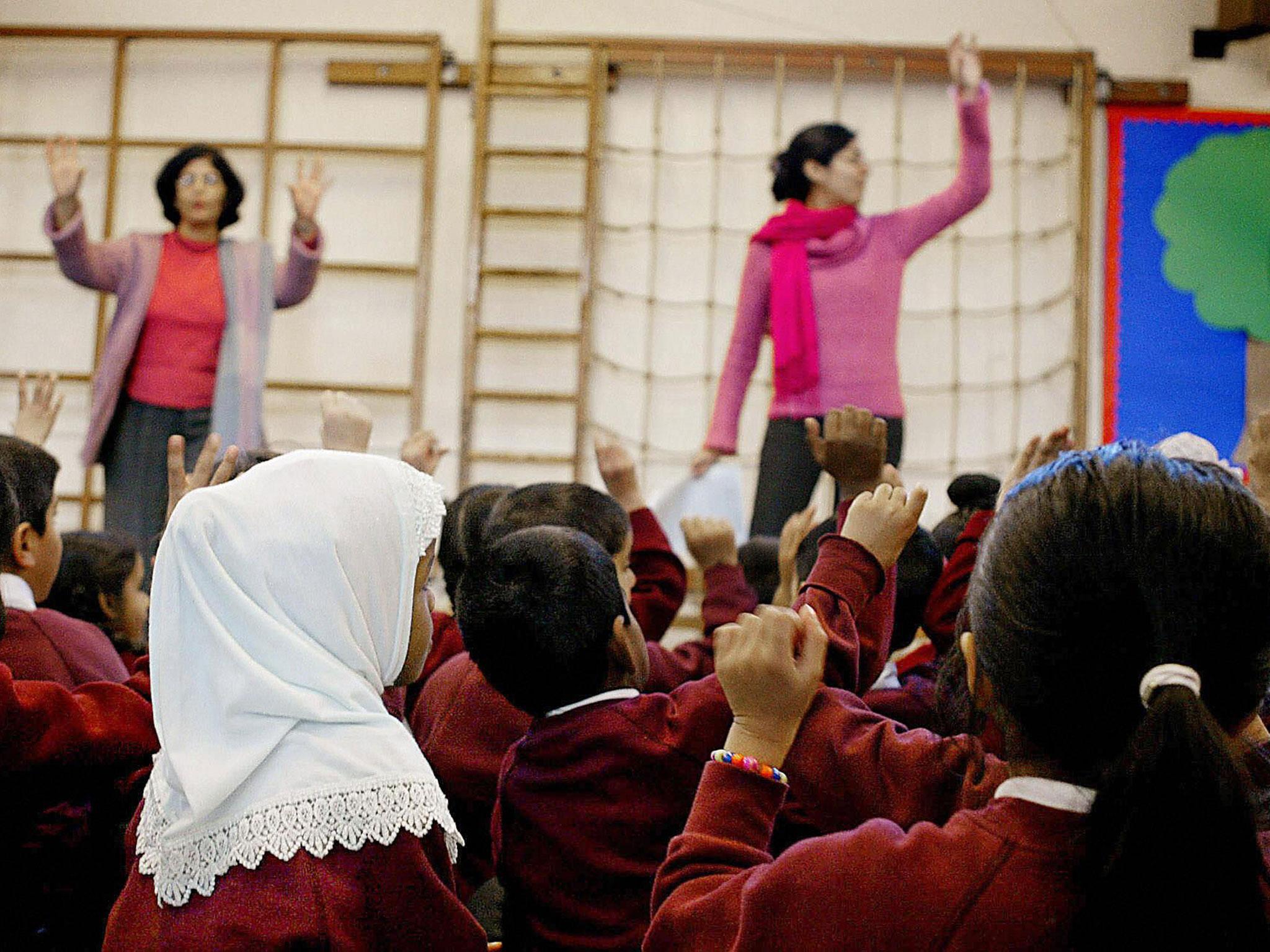Teachers forced to act as 'front-line storm troopers' to spy on pupils under guidelines aimed at combating terrorism
The NUT warned the rules were effectively 'closing down' any classroom discussion of issues surrounding the radicalisation of young people

Your support helps us to tell the story
From reproductive rights to climate change to Big Tech, The Independent is on the ground when the story is developing. Whether it's investigating the financials of Elon Musk's pro-Trump PAC or producing our latest documentary, 'The A Word', which shines a light on the American women fighting for reproductive rights, we know how important it is to parse out the facts from the messaging.
At such a critical moment in US history, we need reporters on the ground. Your donation allows us to keep sending journalists to speak to both sides of the story.
The Independent is trusted by Americans across the entire political spectrum. And unlike many other quality news outlets, we choose not to lock Americans out of our reporting and analysis with paywalls. We believe quality journalism should be available to everyone, paid for by those who can afford it.
Your support makes all the difference.Teachers are being forced to act as "front-line storm troopers" spying on their pupils as a result of new government guidelines for schools to combat terrorism, a teachers' union conference heard today.
Delegates at the National Union of Teachers' annual conference in Harrogate unanimously backed a motion warning the guidelines were effectively "closing down" any classroom discussion of issues surrounding the radicalisation of young people.
Alex Kenny, for the union's executive, said the government guidelines "will damage and prohibit debate in schools".
"We live in a dangerous world where pupils - like us - are trying to make sense of it," he said. "Schools are places where these discussions should take place in an environment of enquiry and it may be an environment where young people say things we don't like."
However, the guidelines were "shutting down debate" as young teachers were unsure what they should do if students raised issues about extremism, he added.
"Young people are also telling their teachers they don't want to discuss them," he said. He cited the instance of the Charlie Hebdo cartoons depicting the prophet Mohamed which led to the massacre of its senior staff - where young people feared the consequences if they said they found the cartoons offensive.

Jan Nielsen, from Wandsworth, south London, added: "We're expected to be a front-line storm trooper to listen, to spy on and to inform the authorities of students we may be suspicious of."
She said schools had been warned that - if they failed to report suspicious of pupils being radicalised - they would face emergency inspections from education standards watchdog Ofsted to check whether they were promoting British values and adequatelt preparing pupils for life in the 21st century. Ofsted's remit allows them to intervene if they feel pupils are not adequately safeguarded and that the school has failed to protect them from extremist influences.
Phillip Allsopp, from Waltham Forest, warned that implementing the government guidelines on reporting extremist activity would "alienate more and more students who won't come to us about things that affect them and worry them".
Delegates also called for the Government instruction to schools to teach "British values" - identified by ministers as democracy, freedom of speech and respect for others - to be scrapped.
Baljeet Ghale, a former president of the union, said: "What makes these values uniquely British and not what you would find supported by people of other cultures and countries?"
She said there was an element of racism in suggesting these values were uniquely British and a suggestion that "one culture's values are superior to another's". "I am proud to be a Londoner, I am proud to be a Kenyan, I am proud to be an Indian and I am proud to be a member of the NUT," she said.
She added that Ofsted should have no place in determining whether British values should be taught in schools.
Vendathal Prekumar, from Redbridge, said the requirement to teach British values was "damaging and dangerous".
"What are British values anyway?" she asked. "They are universal. After centuries of imperialism, the habit of claiming ownership of things that aren't yours must be a difficult habit to drop.
"Telling teachers to teach British values is an attempt to scapegoated children and Muslim students in particular so the Government can looknlike they are being tough on terror and immigrant communities who do not fall into line.
"Muslim kids are being demonised. We have seen this happen in Birmingham and Tower Hamlets where Muslim students are being turned into suspects."
Five schools were failed in Birmingham as a result of the Trojan Horse affair - where an anonymous letter claimed hardline Islamists were plotting to take over the running of several of the city's schools. A secondary school in Tower Hamlets, Sir John Cass and Redcoat Church of England school was also failed after Ofsted judged it had not taken adequate steps to safeguard pupils from extremism as a result of setting up a sixth-form Islamic society.
A Conservative party spokesman said: "The battle against extremism begins at school where young people learn to be active, resilient and tolerant citizens ready to seize the rich opportunities of modern Britain.
"Teaching about the fundamental British values of democracy, the rule of law, individual liberty and tolerance and respect for others is part of our promotion of British values and is at the heart of what every school has to deliver for children."
Radicalisation in schools: Case studies
Case 1 A pupil came under suspicion at his school because he wanted to visit his dying grandfather in Pakistan. This angered the non-Muslim pupils at the school, one of whom argued: “If I want to visit my granddad in Holland I am not under suspicion, but Muslim students are?”
Case 2 A pupil had his laptop confiscated by his head teacher acting on suspicions that he was involved in extremism. This was despite the fact that the boy had just taken part in a discussion about jihadi extremist groups and spoken strongly against joining them. The head teacher said he had found three examples of jihadi websites on the computer. The boy’s explanation was to ask: “How can I argue against something if I don’t understand it myself?”
Case 3 A female pupil asked her teacher whether she should go on a demonstration to protest about the Israeli bombing of Gaza. Under the Prevent guidelines to combat extremism, her teacher feared he should have reported her to the police. Instead, he told her that if she wanted to go on the demonstration, she should seek out a responsible adult to accompany her on the march. The teacher said he was glad that the girl had felt able to discuss the issue with him – but warned that the guidelines were preventing others from doing so.
Join our commenting forum
Join thought-provoking conversations, follow other Independent readers and see their replies
Comments